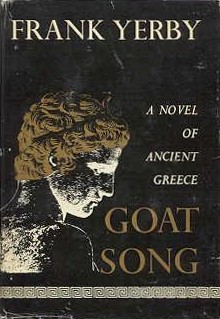Goat Song
- For the novelette by Poul Anderson, see Goat Song.

Goat Song (1967) is a novel by Frank Yerby describing ancient Sparta and the Peloponnesian War with Athens.
Plot summary
Ariston, a Spartiate, is the hero cursed and blessed by a matchless beauty that was the Hellenic ideal. This was a time of burgeoning culture and festering decadence, of excessive cruelty and sexuality. Here are found the battlefield and the helot slave market, the temple and the brothel, the discourse of Socrates and the Dionysian revel of Alcibiades, the brutal code of Sparta and the brilliant sophistication of Athens. Ariston is enslaved and brought to Athens where he earns his freedom and fortune only to face Sparta as an Athenian. He prays at the newly built Temple of Athena Nike on the Athenian Acropolis for safety and victory in the war against Sparta.
The title refers to advice given to Ariston as a desirable young man by a much older mentor: "So dance to the goat song while you can; hark to the panpipes in the hills. Put vine leaves in your hair; drink deeply. Clasp in hot embrace fair youths and maids."
